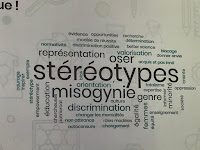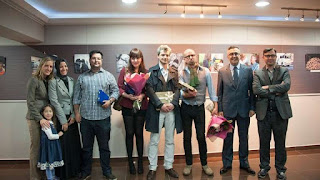On the occasion of the French-speaking final of the MathQuiz, Fedactio gave the floor to the guest of honour, Laurence Broze, professor of applied mathematics at the University of Lille and vice-president of the association "Femmes et mathématiques" [literally: Women & Mathematics], who divides her time between teaching and research. Mrs Broze fights for gender equality in mathematics.
Could you tell us a bit more about your association?
Women & Mathematics has already been existing for about thirty years. We have three main objectives. First, we want to introduce young people to mathematics professions and studies and encourage girls in particular to get involved. Secondly, we also want to fight against gender stereotypes in mathematics and we also want to fight for more parity in the mathematics professions. These are our three main objectives.
Could you tell us what are the actions the association undertakes?
We visit a lot of schools including high schools and universities. We organize days to introduce young girls to the mathematical professions. We also organize an annual conference of female doctoral students in mathematics to encourage girls to pursue a thesis in mathematics. And then we also participate in various actions to promote parity in order to try to raise awareness in academic and private research circles about the promotion of women in these professions.
Why is it necessary to promote mathematics in particular?
If we take a look at mathematics in college, it is the only area (in France) where the proportion of women is not increasing. In other disciplines, there is an increase (sometimes slow), but in maths, nothing. It even tends to decrease. We do not always know why, but we try to sensitize the whole community so that they can mobilize against it. Female professors of mathematics are becoming extremely rare (30 in all for all of France). As an association, we are sad to see that young girls are not involved in it, or only to a very limited extent. I think they are afraid of the sexist behaviour of the profession and not being in their place, but they should not be discouraged. We have to fight to find our place in maths as we have found in other professions.
What would you say to young people who want to study mathematics? Is this a promising career path?
I want to tell them that it is a great job and they should not be embarrassed if they want to do maths. This is an area where it is easy to find a job because there is a shortage of mathematicians. As it is a profession in short supply, you can work on what you want after your studies, and you can even negotiate your salary if you ever work in the private sector. You can have great future prospects, because mathematics is everywhere. We need maths, even maths that we invent without really knowing what it will be used for, and that always ends up being used for something. Mathematicians are given a great deal of autonomy to do research in the subjects they like because we know that, sooner or later, it will be useful for something and that it is a real investment in humanity's knowledge. I would also tell them to see mathematics as a universal language. In all countries of the world, maths is done in the same way. This means that if they become mathematicians, they will belong to a large global community. I wish them the happiness of making mathematics their profession.

| 
| 
|








![[Woman in the spotlight] Laurence Broze: fighting for gender equality in mathematics](https://blogger.googleusercontent.com/img/b/R29vZ2xl/AVvXsEjCm9LmgWOw0ApXAjNqLGQezDgaerg8LtAOMMpTFpFUAGhYHxvnhf9C2SmT9Cq3DNLHn7aW-IymU3XIW4gXi580QgAvVsHY6uCVgSgps6CwU42nSmSNvqe88_CUe8H22Tk0Mh_6OSlWY6By/s320/7.jpg)
![[Woman in the spotlight] Angélique Léonard: empowerment of women in science](https://blogger.googleusercontent.com/img/b/R29vZ2xl/AVvXsEgEWy2qMW5zpE5AcT1XWXSZgLOFnkX-Qyi8H0c-caBMFmZ7VtfwkwVaJ5O_BHJiUtSVXHjGc577wEGqfcCZCfXskcm1ciV645-bGYvFOde3xPypR2pFanu6Rt4zizh_2CBmHfQpEntLIlJZ/s320/WhatsApp+Image+2019-02-13+at+15.51.50.jpeg)







![[Woman in the spotlight] Nisreen Al-Hashemite and the International Day of Women and Girls in Science](https://blogger.googleusercontent.com/img/b/R29vZ2xl/AVvXsEh0si0Hq6qdjK64_Kb-dO09jrVff_i5kZ4I-VYSpQ0KnWh9LHHr_mTovo6tp4qM17T2NrLJMOgT5KVmIzYmxHKT6DLz0bO1naSf74BQhr52DDIIml0qKDT_rUsSV6T4eecHOb6vj8b0Caw/s320/Afbeelding1.png)

![[Woman in the spotlight] Interview with Sophie Lucas, researcher and professor in cancer immunology](https://blogger.googleusercontent.com/img/b/R29vZ2xl/AVvXsEgbSJehnAEAZbST9y3QzGujw29KPPimj9d77gbCfr_uDiWyECbCNOZi74nbewun6bCGn0fyPWEI1iwbhaszCHWfvELs_eC0fyGB7-GBtZPPdKwpMzs1PQ-VvPLytB0ePMH3SKQqoa2aZVNT/s320/51051993_304148233575622_7906204961304739840_n.jpg)












